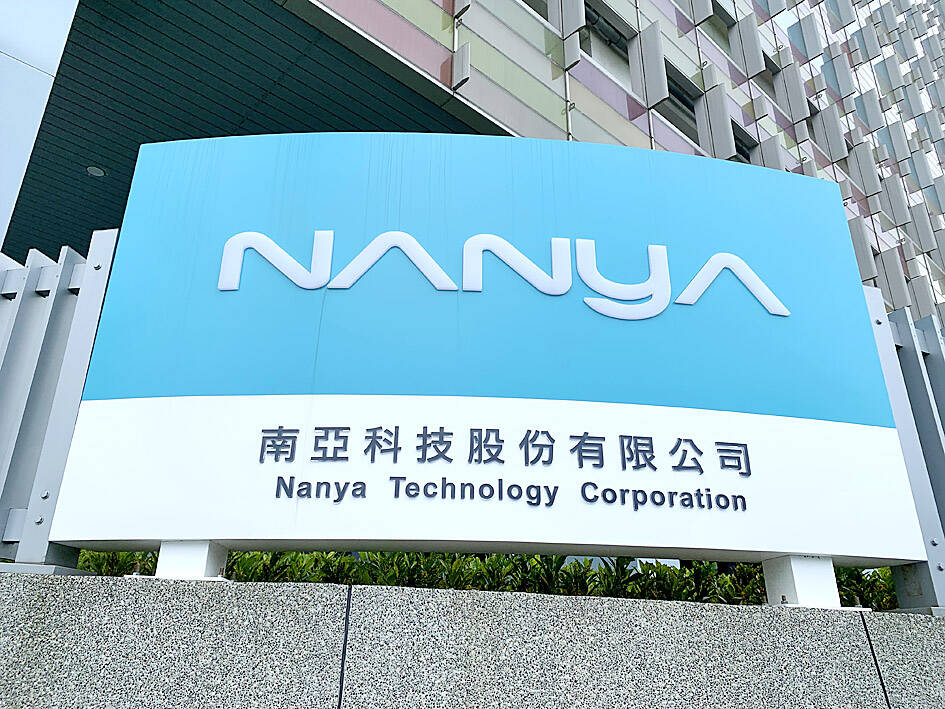Chipmaker Nanya Technology Corp (南亞科技) yesterday said it is aiming to swing back into profit in the second half of this year, from losses of NT$7.45 billion (US$239.24 million) last year, as improving demand for DRAM chips used in artificial intelligence (AI) devices helps reduce supply chain inventory.
As the world’s major memorychip makers are concentrating on shifting capacity to next-generation DDR5 and high-band-memory chips mostly used in AI devices and servers, the supply of mainstream DDR4 chips is slowing, Nanya Technology said.
The shift is also leading to faster inventory digestion throughout the supply chain and triggered a price rebound for memory chips last quarter, it said.

Photo: Grace Hung, Taipei Times
Average selling prices rose by a low single-digit percentage sequentially last quarter, the first uptick in about two years, Nanya Technology president Lee Pei-ing (李培瑛) said.
The uptrend is likely to continue for the rest of this year, Lee said.
“AI PCs and AI smartphones are boosting demand for DRAM chips,” Lee said. “Demand for smartphones in China is also picking up after a trough.”
DRAM chips are to bounce back at a faster rate this quarter than last quarter, he said.
To align with improving demand, Nanya Technology said it is moderating its production. The New Taipei City-based company cut its factory utilization by about 20 percent over the past few quarters to cope with sluggish demand.
The company plans to produce its first DDR5 chips in the third quarter of this year, targeting PC and server applications. The company currently primarily supplies DDR4 and DDR3 chips.
Overall shipments are projected to grow 20 percent year-on-year, reversing a mid-single-digit percentage fall last year, the company said.
Nanya Technology said it plans to budget capital expenditure of NT$20 billion this year, compared with NT$13.1 billion last year.
The company yesterday reported a quarterly loss of NT$2.49 billion last quarter, compared with a loss of NT$2.51 billion the previous quarter.
Gross margin improved to minus-13.6 percent last quarter, from minus-25.2 percent the prior quarter, on the back of better chip prices and lower losses from idled capacity.

COMPETITION: AMD, Intel and Qualcomm are unveiling new laptop and desktop parts in Las Vegas, arguing their technologies provide the best performance for AI workloads Advanced Micro Devices Inc (AMD), the second-biggest maker of computer processors, said its chips are to be used by Dell Technologies Inc for the first time in PCs sold to businesses. The chipmaker unveiled new processors it says would make AMD-based PCs the best at running artificial intelligence (AI) software. Dell has decided to use the chips in some of its computers aimed at business customers, AMD executives said at CES in Las Vegas on Monday. Dell’s embrace of AMD for corporate PCs — it already uses the chipmaker for consumer devices — is another blow for Intel Corp as the company

ADVANCED: Previously, Taiwanese chip companies were restricted from building overseas fabs with technology less than two generations behind domestic factories Taiwan Semiconductor Manufacturing Co (TSMC, 台積電), a major chip supplier to Nvidia Corp, would no longer be restricted from investing in next-generation 2-nanometer chip production in the US, the Ministry of Economic Affairs said yesterday. However, the ministry added that the world’s biggest contract chipmaker would not be making any reckless decisions, given the weight of its up to US$30 billion investment. To safeguard Taiwan’s chip technology advantages, the government has barred local chipmakers from making chips using more advanced technologies at their overseas factories, in China particularly. Chipmakers were previously only allowed to produce chips using less advanced technologies, specifically

MediaTek Inc (聯發科) yesterday said it is teaming up with Nvidia Corp to develop a new chip for artificial intelligence (AI) supercomputers that uses architecture licensed from Arm Holdings PLC. The new product is targeting AI researchers, data scientists and students rather than the mass PC market, the company said. The announcement comes as MediaTek makes efforts to add AI capabilities to its Dimensity chips for smartphones and tablets, Genio family for the Internet of Things devices, Pentonic series of smart TVs, Kompanio line of Arm-based Chromebooks, along with the Dimensity auto platform for vehicles. MeidaTek, the world’s largest chip designer for smartphones

TECH PULL: Electronics heavyweights also attracted strong buying ahead of the CES, analysts said. Meanwhile, Asian markets were mixed amid Trump’s incoming presidency Taiwan Semiconductor Manufacturing Co (TSMC, 台積電) shares yesterday closed at a new high in the wake of a rally among tech stocks on Wall Street on Friday, moving the TAIEX sharply higher by more than 600 points. TSMC, the most heavily weighted stock in the TAIEX, rose 4.65 percent to close at a new high of NT$1,125, boosting its market value to NT$29.17 trillion (US$888 billion) and contributing about 400 points to the TAIEX’s rise. The TAIEX ended up 639.41 points, or 2.79 percent, at 23,547.71. Turnover totaled NT$406.478 billion, Taiwan Stock Exchange data showed. The surge in TSMC follows a positive performance